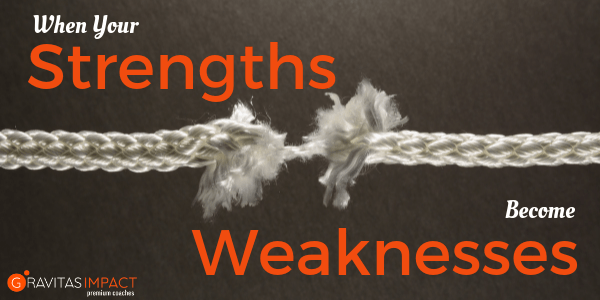When Your Strengths Become Weaknesses
Your strengths play a critical role in your journey to success. They are the skills, characteristics, and knowledge that have helped you define your leadership.
However, too much of a good thing can actually have negative consequences. And though it may seem counter-intuitive, your strengths – when unchecked – can accidentally diminish your team and become a weakness to your company. Let’s explore how this can happen and what you can do to stop it.
The Overuse of Strengths
The quickest way to turn your strength into a weakness is to overuse it, or use it exclusively.
Like any machine, a business is made up of multiple moving parts working together. As a leader, you have to remember that despite the authority of your position you are still only one part of the whole. While this may seem like an obvious truth, it can be easy for leaders to forget this concept in practice by leaning entirely (or mostly) on their particular area of expertise and not bring in outside perspectives.
“When you have a meeting and only one person is talking, or when you become the know-it-all for whatever topic, then that’s a good sign that you’re overusing your expertise,” says Gravitas Impact Premium Coach Abhay Sisodiya.
Sisodiya has helped business leaders across a variety of industries bet on their strengths while maintaining a healthy dose of self-awareness. He says that when leaders find themselves doing more telling instead of collaborating, it’s an indication that their expertise has become more of a detriment than a strength. He also notes that the combination of expertise and decision-making power can take leaders down the slippery slope of jadedness and overconfidence, causing them to feel as if they don’t ‘need’ an outside perspective because they already have it figured out.
“Say you’re a leader writing a policy on workplace harassment,” he says. “You’re an expert on the subject. You can write this thing in your own little world and implement it right away. The problem is that you have to have other perspectives because people may see harassment in different ways, and they’ll plug up holes that you haven’t seen.”
Last year, the Forbes Coaches Council released an excellent article identifying 7 additional signs that your strength is accidentally becoming a weakness and the consequences. Interestingly enough, they all seem to be rooted in the overuse of expertise. See if you notice any of these happening in your business:
You act too quickly and rush to make decisions
You overlook your strength gaps
Your strengths become a comfort zone where you spend all your time
You approach everything reactively instead of creatively
You talk your way out of deals
Your lose the ability to judge objectively
You shoulder too much burden, burning yourself out and keeping others from growing.
Overcoming the Problem
So how can you keep your strengths from diminishing your team? From Sisodiya’s perspective, it is quite simple: Ask for help. It is the true strength of any leader.
“The strength is the ability to see your own weakness and ask for support,” he says. “Better to admit to your weakness, then I can get you the help and expertise that you need.”
As a basic practice, you should always solicit feedback from others. Even when you’re an expert, other perspectives can catch things that might be missed. Before you implement a policy or a new strategy, press the pause button and give others on your leadership team the opportunity to shape and perfect it. When you include them, you’ll find that their input will help close gaps or trigger additional new ideas. This promotes communication, leverage the expertise and buy-in from your team.
Take some time to reflect on your past performance and decisions to see if you’re falling into any of the 7 problem areas we listed above. Where have you spent most of your time? Are you drowning in work while others have little to do? Are you making immediate, knee-jerk reactions to issues? Have you included other perspectives in your decision-making?

